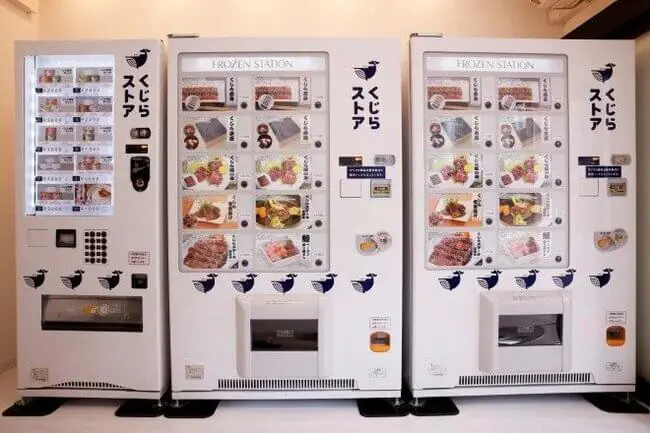A company from Japan had the idea of selling whale meat in vending machines in the city of Tokyo. The initiative divided opinions among the Japanese, who held protests in some parts of the country. In 1986, the International Whaling Commission banned commercial whaling after some species became extinct. But, the hunt still continued in Japan to carry out research. Commercial hunting returned in 2019 in the Asian country. The company that sells whale meat by machine aims to increase the quantity at 100 locations over the next five years in Japan.
The firm focused on whaling branch Kyodo Senpaku was responsible for creating the self-service terminals, known in the country as hanbaikis. Whale Stores have canned, frozen and sashimi-style meat. The price varies between 1 thousand and 3 thousand yen, which in reais would be on average R$40 to R$120.
Before the machines were implemented, a test was carried out at the end of last year. Kyodo Senpaku spokesperson Konomu Kubo said in an interview with the British newspaper The Guardian that sales were beyond expectations. “Sales exceeded our expectations, despite the products not being exactly cheap.” Furthermore, according to Kyodo Senpaku, many curious people and elderly people who want to remember their childhood buy this type of meat.
Regarding the criticism that the company has received since the installation of the whale meat machines, porta-voz states that it does not reflect the opinion of the majority. “We are aware of the criticisms, but they are in the minority. What is important to us is how popular the machines have proved so far.” One of the market leaders, Kyodo Senpaku annually supplies an average of 100 tons of animal meat to be offered to children in school snacks.
Índice de Conteúdo
The tradition of whale meat is not new
The consumption of whale meat was quite intense after the Second World War: in the early 1960s. During this period, around 233 thousand tons were consumed in a period of one year in the Japan. In Japan, whale meat is called kujira. At that time, it was common for meat to be served in school lunches. With awareness campaigns, the whaling industries reduced the amount of whales. In 2021, for example, 1 ton of meat was consumed during one year in the Asian country. But with the presence and modernization of machines by the industry, they contributed to the popularization of this food.
People who are against the consumption of whale meat protest for it to be prohibited. Through a statement, the Whale and Dolphin Conservation remarked: “Only a small, yet influential, group of politicians and industry stakeholders move the whaling interests in the country”, stated the institution, in a note. The industry has the support of conservative politicians, who accuse the opposition groups to whale consumption of killing a tradition in the name of what they call “culinary imperialism”.

The importance of whales for the environment
According to The United Nations Environment Program (UNEP), whales are the most intelligent creatures in the ocean, as well as being the largest. They are responsible for accumulating a large amount of carbon in their bodies. This allows billions of tons of carbon dioxide to be stored per year. According to a study by the International Monetary Fund, protecting whales has a monetary incentive, as these animals are an important nature-based solution for capturing carbon from human emissions, which influences the reduction of global warming.
With an average lifespan of 200 years, when whales die they submerge to the bottom of the ocean and take carbon with them. According to the study, each whale captures at least 33 tons of carbon dioxide.





